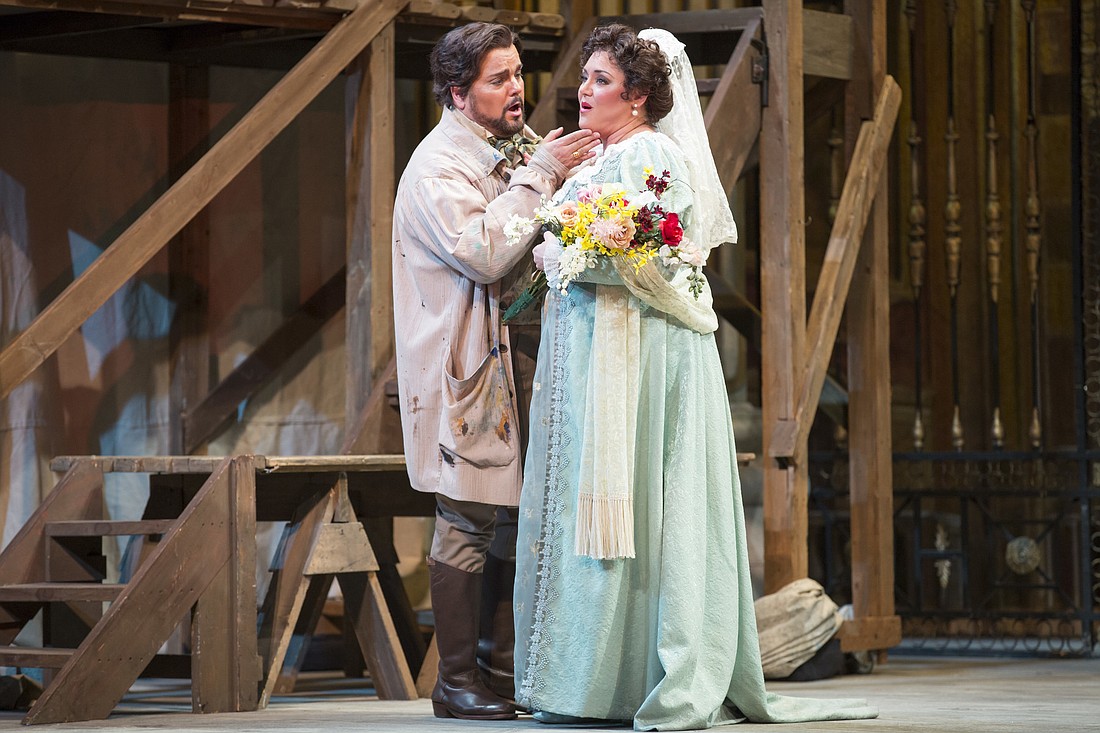- July 10, 2025
-
-
Loading

Loading

There’s a story that purports to be true about “Tosca.” At the turn of the 20th century, at a performance at the Met, the general manager, Giulio Gatti-Casazza, managed to forget to hire the soldiers who are supposed to shoot Mario Cavaradossi in the last act. He heard there were several students from Columbia University in the audience and, assuming they were probably smart and could follow directions, he rounded them up, put them in costume and told them all they had to do was “shoot the lead.” The students astutely assumed “the lead” was Tosca. After all, the opera was named after her. So, instead of killing the tenor, they shot the soprano.
When Puccini named his opera “Tosca,” he did it because Floria Tosca is the very essence of the melodrama. At this season’s Sarasota Opera production, Kara Shay Thomson’s rendition of the title role proves the point. She is Tosca.
From the moment she sings her first notes, “Mario, Mario, Mario,” and sweeps into the magnificent church, to her dazzling “Vissi d’arte,” the night is hers. Her even, huge and beautiful soprano even outshines David P. Gordon’s glorious interior of Sant’Andrea della Valle in the first act, the majestic study of the evil Scarpia in his Farnese Palace in the second and the glistening stars and unfolding of dawn stunningly hanging over the parapets of the Castel Sant’Angelo in the last act.
Tosca is a great singer in Rome. She’s beautiful, glamorous and talented. But she’s also filled with an unreasoning jealousy. Her lover, Mario Cavaradossi, may be a talented artist, but he also manages to get himself in hot water without much effort. He sees a beautiful woman praying at the church, and he paints her face into his mural, arousing Tosca’s suspicions. He helps a political prisoner, sung with passion by Young Bok Kim, and finds himself thrown into prison, tortured and, eventually, put before a firing squad.
Tenor Rafael Davila, who’s sung numerous roles with Sarasota Opera and is now a leading tenor in many major houses, just keeps getting better. His Cavaradossi is both heroic and melancholy. And his voice, especially the top, positively shines.
And then there’s the evil Scarpia, who is a baron in charge of the police. Scarpia is, without a doubt, one of the baddest baddies in opera. A sadist, murderer and, probably, rapist, he’s not a nice guy. Of course he wants Tosca, and he gets off on having her primarily because she doesn’t want him. Cavaradossi becomes his wedge; his way of getting to her without making nice.
Mark Walters was the elegant Baron Scarpia on opening night. (The role will be sung later in the run by Todd Thomas.) Walters’ voice is warm, round, rich and big, but it’s a little too beautiful for Scarpia. Both his singing and his characterization lack that overriding edge that makes you fear Scarpia, even if you’re sitting in the last row of the opera house. He was just a little too refined to be Scarpia, and, even though his words struck terror in our hearts, his voice and demeanor were just a shade too beautiful.
Puccini also triumphs in this “Tosca.” A great man of the theater, there’s not a note or chord of this opera that doesn’t mean something. In the second act, when Tosca has managed to defeat (kill) Scarpia, every musical accent has a stage command: chord, see the knife. Chord, pick up the knife. Chord, stab Scarpia. Chord, wipe the blood off your hands. Chord, place candlesticks around the body. Chord (drumroll), put the crucifix on his chest. It’s brilliant writing. And stage director Martha Collins made sure every one of Puccini’s directions was realized seamlessly.
Conductor Victor DeRenzi and his orchestral forces reinforced the drama onstage just as Puccini directed. The excellence of the cello quartet followed by the haunting sound of the clarinet would be hard to surpass in the last act as Davila sang “E lucevan le stelle” with great passion and warmth.
This “Tosca” belongs, vocally and dramatically, to Tosca. But it’s also a true ensemble piece, and, no matter how many times you’ve seen the work, this production deserves another visit.
IF YOU GO
“Tosca” runs through March 28, at the Sarasota Opera. Call 366-8450 or visit sarasotaopera.org for more information.